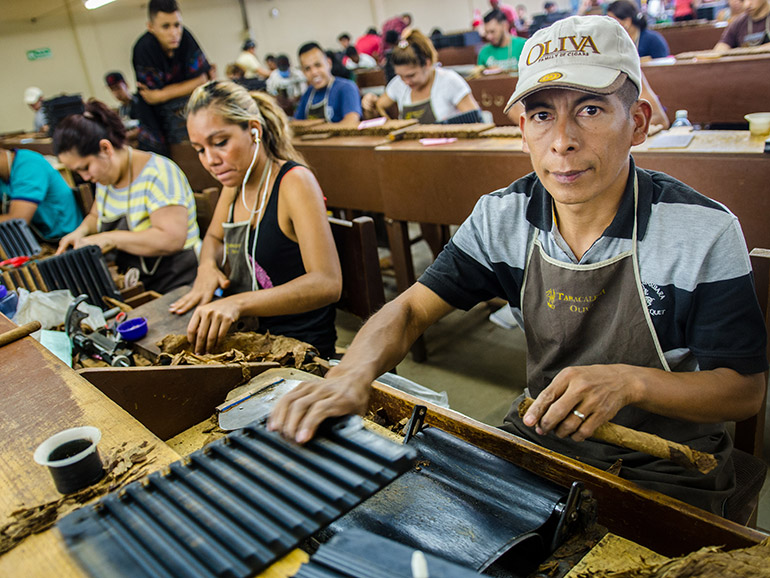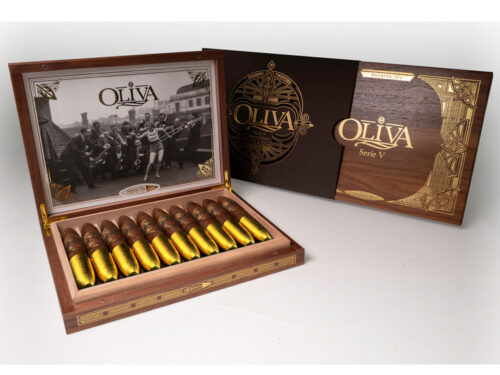“I still feel like it’s mine, like it’s part of me, and hopefully I will be around for many years to come.” Gilberto Oliva sits, cigar in hand, in the Oliva Cigar Company office in Estelí. We’re talking about the company he’s worked for and owned together with his siblings, José, Carlos, and Jeannie, for more than 20 years. That is until 2016, when Fred Vandermarliere took over ownership.
“It’s been our life, but the family was growing, we all have kids now and different members had different interests,” he says. Today only two of them, Gilberto and José, are involved in the business. “I’m very involved in the growing part and the blending, on a consultant basis, but Frederik (Vandermarliere, CEO of J. Cortès) makes me feel like I’m still part of it. Tobacco is my life. I breathe, eat, and sleep tobacco.” José has continued as the CEO; it remains to be seen for how long.
“It was very important for us that José and Gilberto stayed,” says Frederik Vandermarliere. “José is not going to stay on forever, but in order for us to get to know the company better, keep the family spirit and the knowledge, I wanted him and Gilberto here.”
“Even when José steps out as CEO he will probably stay on the board,” Brian Shapiro, director of International Sales at Oliva Cigars, says. “Maintaining the name of Oliva is paramount to Frederik, because it’s such a prominent name and something he wants to protect. The idea is not just to buy what’s great about a company today, but also what’s going to be great about it years from now. Changing the culture or the perception of the company would be counterproductive.”

Gilberto Oliva remains in the company. He’s the man behind almost all of their brands. | Photo: Simon Lundh
Selling was not an easy decision
This wasn’t the first time the Olivas were approached by other companies, but according to Gilberto Oliva it’s never felt quite right before. “The idea of selling has always been there, but when it came to crunch time we always bailed out. It hasn’t been about the money, but how they would manage the brand. We’ve put many years of work into building this brand, and we hoped for a family-oriented company to buy it and not a corporation. When something’s not yours anymore you still want to see it move on and do well. It’s our family name after all, and sometimes with corporations it’s all about numbers. There’s no passion behind it.”
Shapiro adds that having Frederik acquire the company insures a legacy for the Oliva name. That may not have been guaranteed, had it been one of the big cigar companies. Vandermeliere maintains that his main goal is to make sure the quality of the product and the brand recognition remains intact. Nevertheless, all this doesn’t mean that selling was an easy decision.
“The first time I walked into the factory and I was no longer the owner, it was tough,” Oliva says. “But being as involved as I am, it has been a lot easier than I thought.”
Growing together
“The center for long fillers will be in Miami and Nicaragua and the short fillers here in Belgium,” Vandermeliere says. “We will use each other’s knowledge. It’s better than trying to mix it. A lot of long filler producers experience difficulties in Europe because they’re used to selling to the US. Here, the laws are different and we have experience with that. From the Oliva side there’s a lot of tobacco knowledge that can help us, so we need to work together and keep on producing a world-class product in Nicaragua. The people who know most about that are the people over there, so we wouldn’t send a Belgian guy to run the factory in Nicaragua.”

Oliva brings a lot of tobacco knowledge into the merger. “The people who know most about that are the people over there.” | Photo: Simon Lundh
Two families with a couple of hundred years of history have been combined. They both have influence on every side of the tobacco world. “It’s opened up doors,” Shapiro says. “The Cortèses have tremendous contacts. They’ve been doing duty free for years and we’ve had difficulties getting into that market. We just signed a deal to start selling Olivas in Charles de Gaulle airport in Paris and at the same time I’ve formed an agreement with Duty Free Americas to carry J. Cortès.”
According to Shapiro, the brand has already grown substantially in Europe the last few years. “It’s still a long and arduous process because the non-Cuban sector was starting at such a low level. It’s not about selling your brand, you’re changing a culture. It’s very difficult to make people understand there are great wines outside of France; same with cigars. It’s not the fault of the consumer. All they had access to for generations were Cuban cigars. I don’t want to be morbid, but as the older generation begins to pass on, we will have a generation with a much broader perspective on what’s out there.”
Vandermeliere adds that, especially in Europe, they want to convince more people to put Cuban cigars aside and try something else. “We want to be one of the references of handmade cigars in Europe.” A step towards that might be their newest launch, which carries the same name as Oliva’s first creation.
“We’ve reinvented the brand Gilberto Oliva, with a different wrapper and packaging,” Oliva says. “It’s a medium-bodied cigar with a lot of flavor to capture the masses. In the US, mild cigars sell the most, so we’ve tried to create a mild cigar with a lot of aroma that will stand out in that field.”
Whatever happens with the company in the future remains to be seen, but it seems like the name Oliva won’t be going away anytime soon, and the man behind the blends will still be Gilberto Oliva. “Frederik has the last call, but I’m sure Oliva’s going to be around. I will be involved as long as Frederik wants me to be, and I hope to be part of this and take the company to the next level,” he says.












